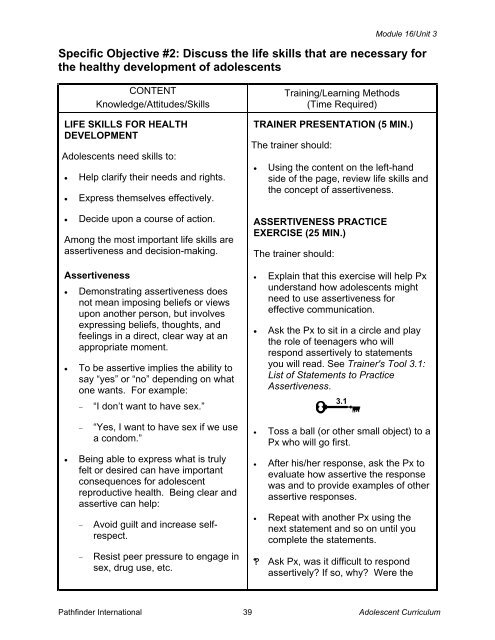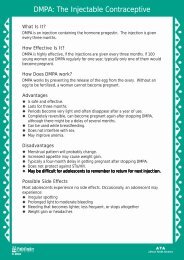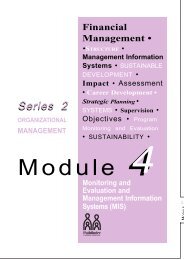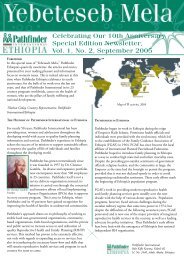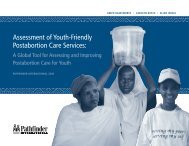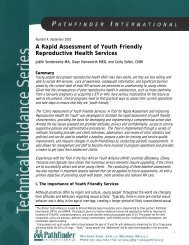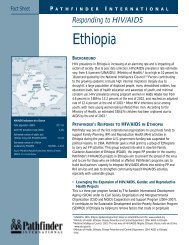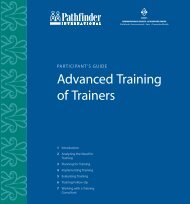reproductive health services for adolescents - Pathfinder International
reproductive health services for adolescents - Pathfinder International
reproductive health services for adolescents - Pathfinder International
Create successful ePaper yourself
Turn your PDF publications into a flip-book with our unique Google optimized e-Paper software.
Module 16/Unit 3<br />
Specific Objective #2: Discuss the life skills that are necessary <strong>for</strong><br />
the <strong>health</strong>y development of <strong>adolescents</strong><br />
CONTENT<br />
Knowledge/Attitudes/Skills<br />
LIFE SKILLS FOR HEALTH<br />
DEVELOPMENT<br />
Adolescents need skills to:<br />
• Help clarify their needs and rights.<br />
• Express themselves effectively.<br />
• Decide upon a course of action.<br />
Among the most important life skills are<br />
assertiveness and decision-making.<br />
Assertiveness<br />
• Demonstrating assertiveness does<br />
not mean imposing beliefs or views<br />
upon another person, but involves<br />
expressing beliefs, thoughts, and<br />
feelings in a direct, clear way at an<br />
appropriate moment.<br />
• To be assertive implies the ability to<br />
say “yes” or “no” depending on what<br />
one wants. For example:<br />
−<br />
−<br />
“I don’t want to have sex.”<br />
“Yes, I want to have sex if we use<br />
a condom.”<br />
• Being able to express what is truly<br />
felt or desired can have important<br />
consequences <strong>for</strong> adolescent<br />
<strong>reproductive</strong> <strong>health</strong>. Being clear and<br />
assertive can help:<br />
−<br />
−<br />
Avoid guilt and increase selfrespect.<br />
Resist peer pressure to engage in<br />
sex, drug use, etc.<br />
Training/Learning Methods<br />
(Time Required)<br />
TRAINER PRESENTATION (5 MIN.)<br />
The trainer should:<br />
• Using the content on the left-hand<br />
side of the page, review life skills and<br />
the concept of assertiveness.<br />
ASSERTIVENESS PRACTICE<br />
EXERCISE (25 MIN.)<br />
The trainer should:<br />
• Explain that this exercise will help Px<br />
understand how <strong>adolescents</strong> might<br />
need to use assertiveness <strong>for</strong><br />
effective communication.<br />
• Ask the Px to sit in a circle and play<br />
the role of teenagers who will<br />
respond assertively to statements<br />
you will read. See Trainer's Tool 3.1:<br />
List of Statements to Practice<br />
Assertiveness.<br />
3.1<br />
• Toss a ball (or other small object) to a<br />
Px who will go first.<br />
• After his/her response, ask the Px to<br />
evaluate how assertive the response<br />
was and to provide examples of other<br />
assertive responses.<br />
• Repeat with another Px using the<br />
next statement and so on until you<br />
complete the statements.<br />
Ask Px, was it difficult to respond<br />
assertively If so, why Were the<br />
<strong>Pathfinder</strong> <strong>International</strong><br />
39<br />
Adolescent Curriculum


